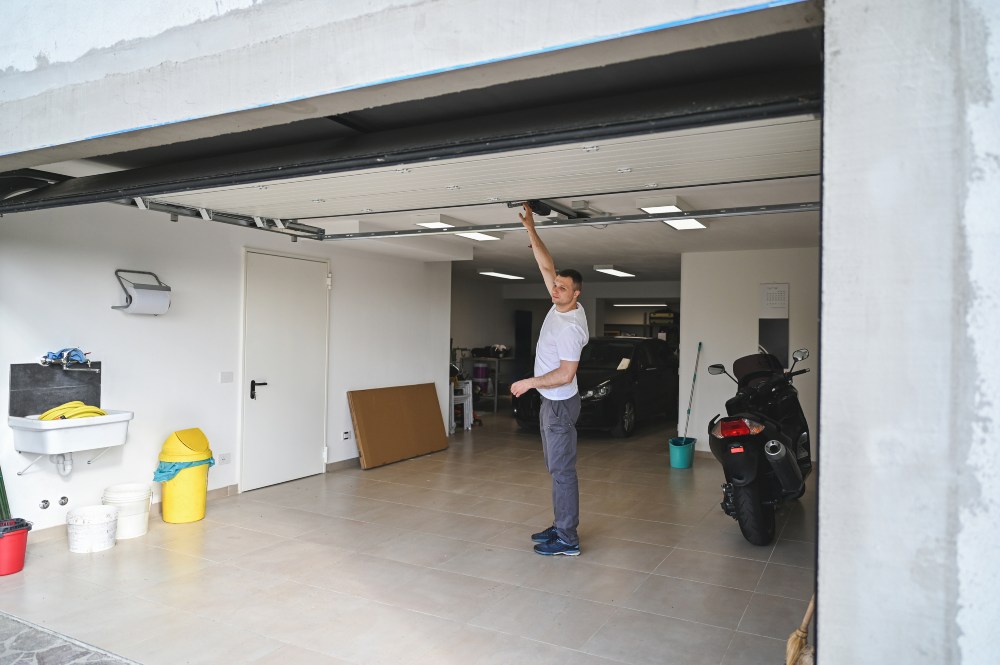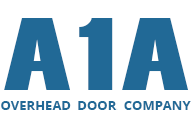
It’s easy to take your garage door for granted when it operates normally. You press the button on the wall or the remote, and the door opens like it should. But then you go to close it again, and it refuses to budge. Similarly, the door may go down a few feet before opening again. It might even touch the ground and bounce back open.
If your garage door won’t close, you need to find out what’s wrong so you can fix it. Here are 10 possible reasons why this is happening and how to troubleshoot each one.
1. Dead Remote Batteries
Sometimes, the simplest issues can cause the biggest headaches. If your garage door remote’s batteries are dead, the door won’t respond when you press the button. That’s why the easiest place to start when your garage door won’t close is to replace the batteries and ensure the remote is within the opener’s range. If changing the batteries doesn’t help, try reprogramming the remote. Refer to the garage door opener owner’s manual for reprogramming instructions.
2. Electrical Issues
Your garage door needs power to operate. Any disruption in the flow of electricity may prevent the door from closing. Check your home’s circuit breaker panel for tripped breakers and reset them if necessary. If the opener still doesn’t work, there might be a wiring issue within the opener or the wall control unit. Electrical repairs can be complex and potentially dangerous, so it’s advisable to seek an electrician’s assistance for these issues.
3. Pulled Manual Release Cord
The manual release cord is a safety feature that disconnects the garage door from the opener, allowing you to open or close it manually. If someone has pulled this cord, the door will not operate automatically. Check to see if the cord is engaged. If it is, reattach it by pulling it toward the opener until you hear a click. This will reconnect the door with the opener, allowing it to function properly again. This simple step can often resolve issues with the door not closing.
4. Faulty, Obstructed, or Dirty Sensors
Sensors are installed on either side of the garage door where it meets the ground to prevent the door from closing if something is in its path. Dirt, dust, or obstructions may cause these sensors to malfunction. Clean them gently with a microfiber cloth and ensure they are aligned correctly, with the lenses facing each other. If the sensors still don’t work after cleaning, they might be faulty and require replacement.
5. Bent Tracks or Dirty Rollers
Tracks and rollers guide the garage door smoothly. If the tracks are bent or blocked, or the rollers are dirty or damaged, the door may not close properly. Inspect the tracks for visible bends or obstructions and clear them. Use a silicone-based lubricant on the rollers to help them move smoothly. If the tracks or rollers are severely damaged, professional repair or replacement might be necessary to restore proper function.
6. Misadjusted Travel Limits
The travel limits on your garage door opener determine how far the door moves when opening or closing. If these limits are set incorrectly, the door might stop before fully closing. Adjusting the travel limits can resolve this issue. Most garage door openers have knobs or screws to change these settings, typically found on the motor unit. Consult your owner’s manual for precise instructions on how to adjust the travel limits.
7. Worn or Broken Springs
Garage door springs come in two primary types: torsion and extension. These springs balance the door’s weight during operation, making it easier to open and close. When the springs break or lose tension, the door may not close properly and could become dangerous to operate. Signs of worn-out springs include an unbalanced door, excessive noise during operation, and visible gaps or rust on the springs. Due to the high tension and risk of injury, it’s best to hire a professional to replace broken springs safely.
8. Damaged Cables
Cables work with torsion or extension springs to lift and lower your garage door. If these cables are worn or broken, the door can become misaligned and fail to close. Inspect the cables for fraying or visible damage. Because of the high tension involved, cable replacement should be handled by professionals to avoid injury and ensure the cables are installed securely.
9. Misaligned Door
A garage door that falls off its track won’t close properly. This can happen due to impacts or regular wear and tear. Inspect the tracks and rollers for alignment issues. You might be able to fix minor misalignments by loosening the screws holding the tracks in place, realigning them, and then retightening the screws. For significant misalignments, it’s best to call a professional.
10. Damaged Garage Door Panels
Dents, warps, or other physical damage to the garage door panels can obstruct the door’s movement and prevent it from closing. Inspect the panels for damage that may be preventing normal operation. Minor dents can sometimes be fixed with a rubber mallet, but more severe damage might require professional repair or panel replacement to restore the door to its normal operating condition.
Contact A1A Overhead Door
At A1A Overhead Door, we know how frustrating a malfunctioning garage door can be. With 27 years of experience to draw from, we offer garage door repair and maintenance services you can count on. Whether it turns out to be a simple fix or a complex job, our team is here to help. Contact us at 904-821-8463 to schedule garage door services in Jacksonville, FL.
- A1A Overhead Door Company11
- Energy Efficiency3
- Garage Door30
- Garage Door Installation13
- Garage Door Maintenance20
- Garage Door Openers15
- Garage Door Repair20
- Garage Door Safety38
- Garage Door Spring6
- Garage Door Springs5
- Garage Door Styles13
- Garage Doors8
- Garage Organization5
- Google+ Review1
- History of Garage Doors6
- Hurricane Code6
- Infographic2
- Insulation0
- Liftmaster0
- New Garage Door10
- Overhead Doors11
- Review0
- Wounded Warrior Project1
- Yelp Review0
